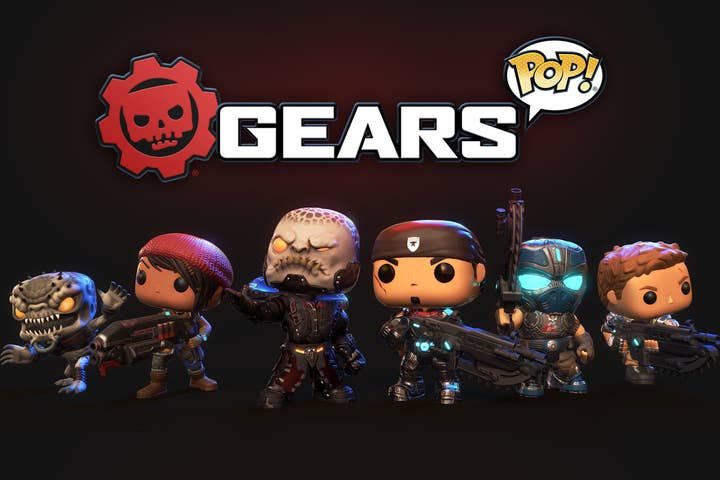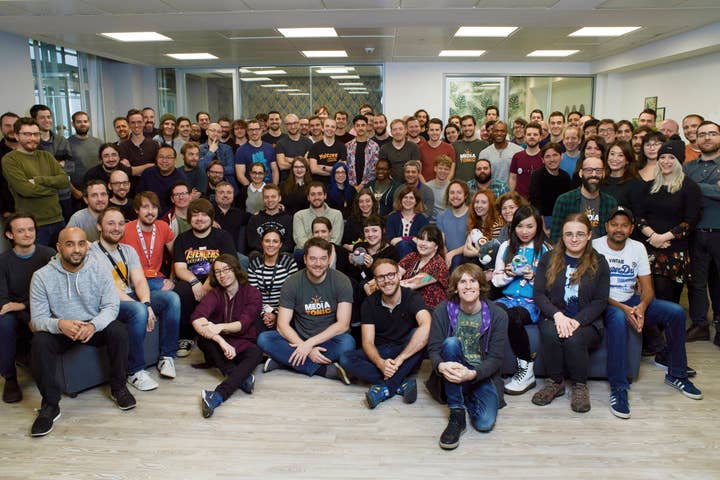How Mediatonic is bringing Gears of War to mobile
UK developer discusses the origins of its Gears Pop partnership with Microsoft and how Funko figures will inspire a new take on chainsawing aliens to death
In lieu of Master Chief's continued absence, Microsoft is working on a trio of Gears of War titles -- with two due by the end of the year.
Naturally, fans are most excited about Gears 5 (so famous have the series' Lancer-wielding antics become that Xbox has apparently dropped the "of War"), with strategy enthusiasts intrigued by the prospect of the PC-exclusive Xcom-like Gears Tactics. The third is much more unusual.
Gears Pop is the franchise's first mobile outing and, as the logo and title imply, is modeled on the hugely popular Funko Pop figurines. Little has been revealed about the title since its E3 unveiling, though it's a safe bet that this is a free-to-play outing designed as both fan service for die-hard followers and a potential entry point for mobile gamers -- an audience many times larger than that of Xbox.
One thing that has come to light is the developer: Mediatonic.
This London-based studio is already known for Square Enix RPG Heavenstrike Rivals, the international remake of pigeon-dating oddity Hatoful Boyfriend, and Fantastic Beasts: Cases from the Wizarding World, a hidden-object game based on the works of JK Rowling.
"It's a very brutal, ultraviolent game -- which we love -- but how do we take that to mobile for a broader audience?"
Helen Burnill, Mediatonic
Mediatonic has already established a long-standing relationship with Xbox, having worked on Xbox Live Arcade title Foul Play and Fable Fortune, a card-collecting spin-off the studio helped bring to market after Microsoft closed down creator Lionhead.
According to the studio's founders, Gears Pop originated from conversations with leaders of Gears developer The Coalition at E3 2017 -- in fact, The Coalition and Xbox approached Mediatonic to work out how they could bring the series to mobile.
"[After working] on Fable Fortune... we'd started to build some trust and -- hopefully -- shown some sensitivity to AAA IPs, reimagining them for new gameplay and new platforms," commerical director Helen Burnill tells GamesIndustry.biz. "So we were known at Microsoft."
Co-founder Paul Croft adds: "We've worked with a lot of AAA IP at this point, we have a lot of experience in the studio with writing and storytelling, and that helps us get under the skin of these brands. And then combined with that we also have several years' experience in free-to-play on mobile and a great relationship with Microsoft. All of that made us a great fit.
He continues: "Throughout the process, we've been working really closely with The Coalition, playtesting the game. We've got a big team of designers who are leading the game, and we're just learning as much as we can from The Coalition about the IP, what makes it special and then trying to imbue that in the mobile game."

The use of the Funko style makes for a strange juxtaposition with the subject matter. After all, Gears is a series about dude-bros chainsawing aliens in half with the sharp end of their assault rifle -- not an obvious fit for the family-friendly figurines you find on store shelves, nor is it particularly prevalent on mobile app stores. Mediatonic is all too aware of the challenge that presents.
"It's a very brutal, ultraviolent game -- which we love -- but how do we take that to mobile for a broader audience?" says Burnill.
Croft adds: "Mobile is a different platform to console. You have different types of players on there, you have different restrictions in terms of age-rating and that kind of stuff.
"The Funko IP has been great actually, because it gives us licence to be a bit more playful. The Lego games are a great comparison"
Paul Croft, Mediatonic
"With any IP, we look to boil it down to what the strengths are, what makes that IP unique, what are the characteristics. With Gears, it's things like cover combat and mechanics that are inherent to the franchise. So it's been about... taking those without necessarily taking the gory, adult gameplay that's a great fit for a console 18+ audience, but not necessarily a wider mobile audience.
"The Funko IP has been great actually, because it gives us licence to be a bit more playful. The Lego games are a great comparison; they sometimes tackle quite adult themes but... it provides a new lens for people. You can enjoy Lego Batman if you're a super hardcore fan of the comics, but you can also enjoy it if you don't know anything about Batman. So it's really about taking that angle towards the vinyl toy aspect of it."
The Lego games' playfulness is best shown through the sense of humour abundant in each title, offering slapstick takes on the most iconic moments of blockbusters like Star Wars, Lord of the Rings, Harry Potter and Jurassic Park. Does Croft's comparison mean we can expect Gears Pop to be more of a parody of the main series?
"People will have to wait and see," Burnill teases, "Historically we've been known for tongue-in-cheek humour, having a little bit of a left-of-centre stance on things."
Croft adds: "It's definitely not going to take itself too seriously. You can't really play that po-faced."

Another benefit of the Funko partnership is it has "already established a visual style for Gears". Thus far, the figurine range has offered a stylised take on series heroes Marcus Fenix, Dominic Santiago and even Gears 5 frontwoman Kait Diaz, plus almost a dozen more. In a way, this has removed some of the legwork for Mediatonic.
"Because there already are Gears Funkos, we haven't needed to create a brand new art style for the characters," says Croft. "That's been one of the positives about the partnership. It's been about taking the interesting things from each of the IPs and combining them together.
"How do you do an explosion in the game? What does the terrain look like? There's the toy style for characters but outside of that is stuff Funko hasn't necessarily had to do before. So that's been tonnes of fun in terms of working out the effects of all the things that happen in the game. Even the styling of the UI, how it's presented when you get a new character -- we've been collaborating with Funko on all of that."
"There's a lot of IP that has yet to be exploited at its best on mobile. It's not just about applying a brand to something. We want it to be visible that we extended that universe [and] did it justice"
Dave Bailey, Mediatonic
Co-founder Dave Bailey adds: "The reality is everyone who's involved in a project and sees what's coming out of it is absolutely delighted with the art style and how it's all coming together. We've been super happy with how it's come off, and I think it'll be a really positive thing when people see it."
When the opportunity to work on Gears arose, Burnill tells us "we've never turned around a pitch so quickly because we were so excited", but the studio is actually quite cautious about which IP it works with.
"We turn down a heck of a lot more than we take on, because it has to go through this process with us," she says. "Firstly, do we think there's a commercial opportunity with this game, do we think it will do well? But also, creatively, are we excited about it? Do we think we can make meaningful gameplay sing with this IP? Can we add value to this universe? Is there a point in this game existing? If it doesn't pass through these filters, then we don't do the game."
Bailey adds: "There's a lot of IP that has yet to be exploited at its best on mobile. I think that's a great opportunity for us to bring things to mobile sensitively -- it's not just about applying a brand to something. If we're working with an IP, we still want it to be visible that this team worked on it and that we extended that universe, that we did it justice."
Aside from Fantastic Beasts, being part of the Wizarding World of Harry Potter, Gears of War is perhaps the biggest brand Mediatonic has ever worked on -- and certainly the most famous games brand. Yet the studio acknowledges it faces something of a visibility problem, often remaining in the background while its games are driven primarily by the IP they bear.
"I think a lot of that is our own fault," says Burnill. "We're just too busy making games."
Bailey adds that, over the past three years, the developer has quietly grown its headcount from 60 to 170, so has "been quite busy managing all that". But with the studio now at a more formidable size, he feels the time is ripe for Mediatonic to step out of the shadows.
"As you go through that and come out the other side, you get to a point where suddenly the operations, the core business is a well-oiled machine, so you can start think about doing the nicer things," he says. "Like investing in marketing and PR, building our brand. It's come a bit late, but I think we're ready to do that."
Croft agrees: "Although we're not that well-known in the wider industry, we are well-known with the people we work with on a daily basis. Having that network over a long time means that if the worst does happen with a project, we can go out and bring in a new one fairly quickly."
Dave quickly adds: "It's more like the opposite at the moment. In the past six months we've been turning away stuff -- even stuff we really would rather do -- but we're booked at the moment."
